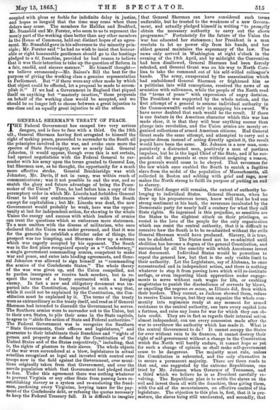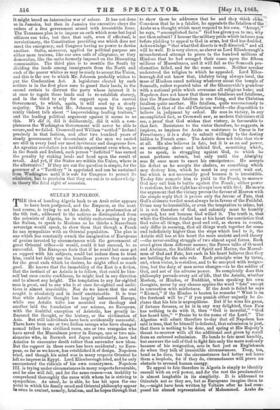GENERAL SHERMAN'S TREATY OF PEACE.
THE Federal Government has escaped two very serious dangers, and is face to face with a third. On the 19th ult., General Sherman having first arrogated to himself the right of making peace, proceeded to surrender to the South all the principles involved in the war, and evoke once more the spectre of State Sovereignty, now so nearly laid. General Johnston, it would appear, though even this is not certain, had opened negotiations with the Federal General to sur- render with his army upon the terms granted to General Lee, but Sherman saw, as he thought, the opportunity for a much more effective stroke. General Breckinridge was with Johnston, Mr. Davis, if not in camp, was within reach of communications; was it not possible to end the war, and so snatch the glory and future advantage of being the Peace- maker of the Union? True, he had before him a copy of the peremptory order in which Mr. Lincoln had forbidden General Grant to hold any conferences whatever with the South except for capitulation ; but Mr. Lincoln was dead, the new Government would probably be weak, here was the oppor- tunity at last for independent action, for showing to the whole Union the energy and success with which leaders of armies can treat the questions which so embarrass mere statesmen. To a man smitten with the disease of militarism, who once declared that the Union was under governed, and that it was for the generals to establish a stricter order of things, the prospect was too tempting, and Sherman drew up a scheme which was eagerly accepted by his opponent. The South was in the first place recognized openly as a "Confederacy," a single government commanding armies, competent to make war and peace, and enter into binding agreements, and Gene- ral Johnston was allowed to sign himself as "commanding the armies of the Confederate States." The whole theory of the war was given up, and the Union compelled, not to pardon insurgents or receive back seceders, but to re- spect the terms of a treaty contracted with a foreign enemy. In fact a new and obligatory document was im- ported into the Constitution, imported in such a way that, while it could not be explained by the Constitution, the Con- stitution must be explained by it. The terms of the treaty were as extraordinary as the treaty itself, and read as if General Sherman had intended to discredit the Government he serves. The Southern armies were to surrender not to the Union, but to their own States, to pile their arms in the State capitols, to agree to "abide the action of State and Federal authorities." The Federal Government was to recognize the Southern "State Governments, their officers and legislatures," and guarantee to their inhabitants their franchises and "rights of person and property as defined by the Constitution of the United States and of the States respectively," including, that is, the rights of planters to their slaves. The whole objects of the war were surrendered at a blow, legislatures in actual rebellion recognized as legal and invested with control over troops now in the field against the Government, over muni- tions originally taken from that Government, and over the servile population which that Government had pledged itself to free. Under this agreement there was nothing whatever to prevent Virginia or any other State from passing laws re- establishing slavery as a system and re-enslaving the freed- men, pardoning every Virginian, levying taxes for the pay- ment of the Confederate debt, or refusing the quotas necessary to keep the Federal Treasury full. It is difficult to imagine
that General Sherman can have considered such terms endurable, but he trusted to the weakness of a new Govern- ment, and actually pledged himself in writing "to promptly obtain the necessary authority to carry out the above programme." Fortunately for the future of the Union the war has educated her statesmen ; her President is a man resolute to let no power slip from his hands, and her ablest general maintains the supremacy of the law. The news only arrived in Washington at eight o'clock in the evening of the 19th April, and by midnight the Convention had been disallowed, General Sherman had been fiercely rebuked, and General Grant was on his way to North Caro- lina to take the command out of his self-willed colleague's hands. The army, exasperated by the assassination which had emboldened General Sherman or frightened him as a politician into wild conceptions, received the news of an armistice with sullenness, while the people of the North read the "terms of peace" with expressions of angry derision. The President was supported by the whole nation, and the first attempt of a general to assume individual authority in the Commonwealth ended only in snapping his sword. We have never doubted that such would be the result. If there is one feature in the American character which this war has made clear, it is that they will bear anything sooner than plunge into revolution, and the Union armies are merely or- ganized collections of armed American citizens. Had General Grant made the same attempt, and attempted to carry out a popular dream instead of acting directly against it, the result would have been the same. Mr. Johnson is a new man, com- paratively a distrusted man, positively a man of partizan impulses, but he is the legal Chief of the State, and if he sus- pended all the generals at once without assigning a reason, the generals would cease to be obeyed. That reverence for the law which once enabled the South to snatch a fugitive slave from the midst of the population of Massachusetts, all collected in Boston and sobbing with grief and rage, now makes the North strong to fulfil its purpose of putting an end to slavery.
The third danger still remains, the extent of authority be- longing to individual States. General Sherman, when he drew up his preposterous terms, knew well that he had one strong sentiment at his back, the reverence inculcated by the Democratic party for nearly half a century for what they call State rights. So ingrained is this prejudice, so sensitive are the States to the slightest attack on their privileges, so rooted is the love of the people for the only organization which can resist the central authority, that it is difficult to conceive how the South is to be re-admitted without the evils General Sherman would have produced. Slavery, it is true, can be abolished. The States need not be re-admitted until abolition has become a dogma of the general Constitution, and surrounded by all the sanctity with which Americans invest that document. Individual States would be powerless to repeal the general law, but that is the only visible limit to their authority. Let the Legislature, say of Alabama, be once reconstructed and in independent action, and there is nothing whatever to stop it from passing laws which will re-institute serfage, or even importing black apprentices under engage- ments to serve without cash wages for life, or enabling magistrates to punish the disobedience of servants by blows, or expelling the negroes en masse, as Illinois did, from within their borders. They cannot, as Jackson showed them, refuse to receive Union troops, but they can organize the whole com- munity into regiments ready at any moment for armed resistance to the central authority, can turn every capitol into a fortress, and raise any loans for war for which they can ob- tain credit. They are in fact as regards their internal action almost independent, can use every concession made after the war to overthrow the authority which has made it. What is the central Government to do ? It cannot occupy the States for ever without ruin to its finances, it cannot destroy their right of self-government without a change in the Constitution which the North will hardly endure, it cannot hope as yet for such a change of opinion as shall make self-government cease to be dangerous. The majority must rule, unless the Constitution is subverted, and the only alternative is to secure a permanent majority. There are three roads to that end, one suggested by the extreme Republicans, one tried by Mr. Johnson when Governor of Tennessee, and a third which we believe he is as President carefully re- volving. The Republican plan is to settle the slaves on the soil and invest them all with the franchise, thus giving them, with the aid of the mountaineers, an effective control of the legislature. The objection to this plan is, first, that it is pre- mature, the slaves being still uneducated, and secondly, that
it might breed an internecine war of colour. It has not done so in Jamaica, but then in Jamaica the executive obeys the orders of a free government armed with irresistible force. The Tennessee plan is to impose an oath which none but loyal citizens can take, but then that oath, even if effectual, is revolutionary, the Constitution providing one which does not meet the emergency, and Congress having no power to devise another. Oaths, moreover, applied. for political purpose are either mere truisms, like our own oath of allegiance, or they demoralize, like the oaths formerly imposed on the Dissenting communities. The third plan is to resettle the South by dividing the lands among immigrants from the North and such of the poorer whites as may be ready to accept the Union, and this is the use to which Mr. Johnson probably wishes to put the Confiscation Act. A legislature elected by such settlers is in the first place sure to guard their lands, in the second certain to distrust the party whose interest it is at once to regain those lands and to re-establish slavery, and in the third to rely for support upon the central Government, to which, again, it will send up a steady majority. This is what Mr. Johnson means by his appa- rently violent talk about " impoverishing leading traitors," and the leading political argument against it seems to us this. We did it, did it deliberately, did it with a com- pleteness the Washington Government will never be able to secure, and we failed. Cromwell and William "settled" Ireland precisely in that fashion, and after two hundred years of steady government the descendants of the men we ousted are still in every land our most inveterate and dangerous foes. An agrarian revolution is a terrible experiment even when, as in the South and Ireland, each person "forfeited" has earned the penalty by staking lands and head upon the result of revolt. And yet, if the States are within the Union, where is the alternative ? If they are out the question is simple, for the governor of a " Territory " is appointed and can be sustained from Washington until it is safe for Congress to permit its admission, but to proclaim that they are out is to acknowledge in theory the fatal right of secession.































 Previous page
Previous page